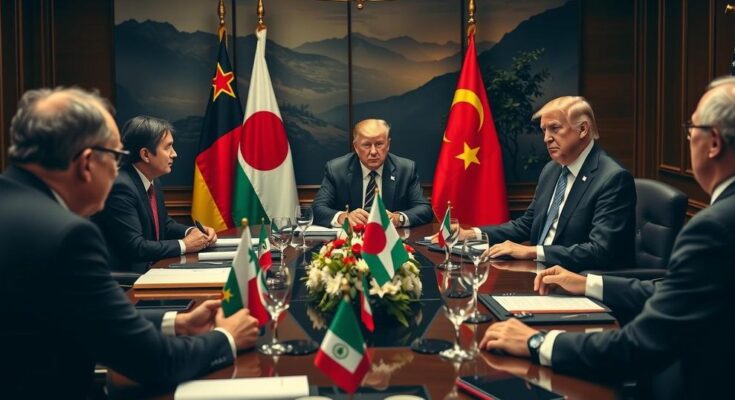Donald Trump has threatened a 100% tariff on BRICS nations if they pursue alternatives to the U.S. dollar. This reflects broader economic tensions as BRICS seeks to reduce reliance on the dollar. Analysts suggest significant challenges in creating a competing currency, emphasizing the U.S. dollar’s dominant role in global trade. Trump’s tariff threat could raise consumer prices and has drawn criticism for potentially weakening U.S. economic influence.
President-elect Donald Trump recently announced a potential imposition of a 100% tariff on BRICS nations—namely Brazil, Russia, India, China, South Africa, Egypt, Ethiopia, Iran, and the United Arab Emirates—if they attempt to replace the U.S. dollar as the preferred global currency. Trump’s warning highlights concerns over the creation of a new rival currency initiated by BRICS, stating that failing to affirm their commitment to the dollar could lead to significant tariffs and diminish trade contributions to the U.S. economy.
The BRICS coalition aims to enhance collaboration among emerging economies and reduce dependency on the U.S. dollar, as seen in discussions led by leaders like Vladimir Putin, who called for a new international payment system due to perceived weaponization of the dollar. Brazilian President Luiz Inácio Lula da Silva has further advocated for a common South American currency to lessen reliance on the dollar in trade.
Despite these aspirations, experts contend that establishing a viable alternative to the dollar is fraught with challenges, given the dollar’s entrenched role as the premier reserve currency globally, comprising around 58% of reserves, with essential commodities still priced predominantly in dollars. Economists like Mark Weinstock suggest that BRICS nations currently lack the institutional frameworks to foster global confidence in a new currency. South Africa’s recent statements support this viewpoint, emphasizing ongoing transactions in national currencies instead of a shared BRICS currency.
Trump’s threatened tariffs could significantly raise consumer costs for goods imported from BRICS countries, resulting in inflationary pressures on the U.S. economy. Notably affected products include coffee from Brazil, clothing, and electronics from China. However, some economists have criticized Trump’s reciprocal trade tactics, raising concerns about their implications for the U.S. dollar’s global standing and reinforcing a narrative of U.S. weakness. Economists caution that such actions may unintentionally encourage a shift away from dollar reliance, as noted by Brad Setser of the Council on Foreign Relations.
The BRICS economic coalition, encompassing Brazil, Russia, India, China, South Africa, Egypt, Ethiopia, Iran, and the United Arab Emirates, was founded in 2009 to promote interests prevalent among emerging markets while decreasing their dependency on the U.S. dollar. This organization is a response to the significant leverage the U.S. dollar provides, allowing the United States to maintain lower borrowing costs and considerable geopolitical power. As some BRICS leaders advocate for developing alternative financial systems and currencies, tensions with U.S. economic policy intensify, particularly regarding international trade practices and tariffs.
In summary, Donald Trump’s assertion of a potential 100% tariff on BRICS countries serves to deter the formation of an alternative currency that could undermine the U.S. dollar’s supremacy. Although the ambition for a BRICS currency reflects the desire for economic autonomy among member nations, experts contend that practical, political, and economic obstacles render such initiatives improbable. Moreover, the implementation of heavy tariffs could negatively impact U.S. consumers while inadvertently promoting greater diversions from the dollar as a global standard.
Original Source: www.cbsnews.com




